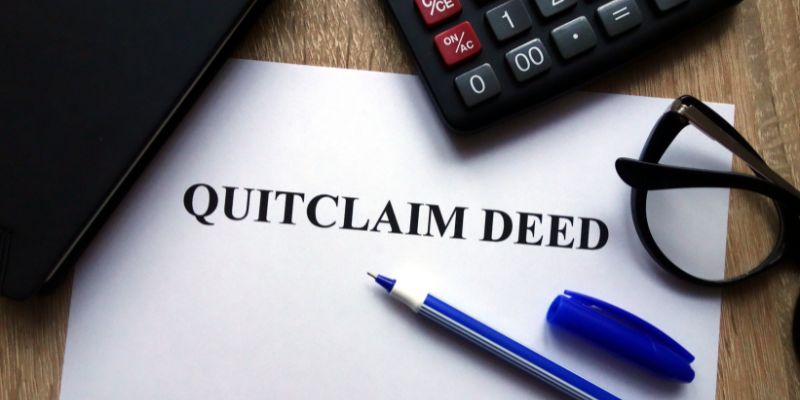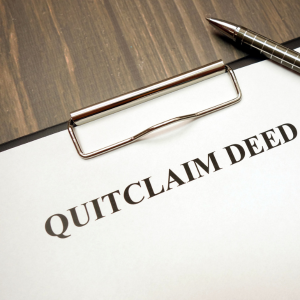
You need to know how to use a quitclaim deed if you want to sell your house in New Orleans, LA, more easily. This page goes into great detail about how to use a quitclaim deed in Louisiana, including what makes it different and what the law says about it. This book has useful information that can help you choose whether to move property amongst family members or deal with title issues. Learn about the good and bad sides of quitclaim deeds, and get the information you need to make property transfers in New Orleans without any hassles.
Key Highlights
- Quitclaim deeds in Louisiana make it easy and hazardous to move property, which is great for those who know each other.
- Louisiana’s civil law system is tighter than those in other states when it comes to how quitclaim deeds must be written and looked at.
- Title insurance is very important if you move to Louisiana and want to protect yourself from title problems that come up out of the blue.
- When you sell with a quitclaim deed, you have to follow specific requirements and keep records.
- One of the most common problems is figuring out how to deal with community property regulations and keep the New Orleans market competitive.
What You Should Know About Quitclaim Deeds in Louisiana
When it comes to quitclaim deeds, it can be hard to understand property deeds in Louisiana. This guide shows you what quitclaim deeds are and how Louisiana handles them differently from other states. Making these legal tools easy to grasp might help potential sellers make smart decisions about property transfers. These elements are important whether you want to give someone else ownership or just want to know what a quitclaim document means. This introduction tells you what to look for in Louisiana quitclaim deeds that set them apart from other kinds of deeds.
What Does It Mean to Own a Quitclaim Deed?
A quitclaim deed is a legal document that lets one person convey their interest in real estate to another person without promising that there are no other claims on the title. In this kind of deal, the grantor doesn’t undertake to fix any problems with the property’s title; they just give up their claim on it. This is what makes quitclaim deeds so easy to understand and so dangerous: they don’t protect or guarantee the grantee in any manner.
Because of this, people who really trust each other, like family members, often use quitclaim deeds. This is also true when a name is spelled wrong and needs to be fixed. You should know what a quitclaim deed is used for in Louisiana, especially if you need to make quick and informal transfers.
A quitclaim is a quick way to give up your rights to a property. This is especially true if you need to make little changes or give property to a family member. Quitclaim documents are a simple way for heirs to settle issues or for the court to do so without entering into a lot of detail about title warranties.
People might be curious about how these activities fit into Louisiana’s civil law system, which is different from the common law systems utilized in much of the US. Quitclaim deeds are not usually the best solution when you need complete clarity and a title that can’t be challenged, because they are so easy to understand.
A quitclaim deed can still be an effective way to finalize a sale for many property owners and sellers, especially when they’re confident the title is valid. As property values climb in busy markets like New Orleans, understanding how quitclaim deeds work—and when to use them—becomes essential for protecting both legal and financial interests. And for anyone looking to move quickly, we buy houses in New Orleans, making the process even smoother.
What Makes Louisiana Quitclaim Deeds Different from Those in Other States

The civil law system in Louisiana is different from the rest of the US since it comes from French and Spanish law. Quitclaim contracts frequently let you shift property swiftly without making a formal promise of ownership. Louisiana law, on the other hand, adds another level of examination.
A quitclaim deed usually gives the recipient whatever interest the grantor has, but it doesn’t promise anything. In Louisiana, where the laws about communal and distinctive property are more relevant, quitclaim deeds need to be looked at more closely.
It’s tougher to tell who owns what in Louisiana because of the community property system. This means that the things that spouses buy together while they are married are owned by both of them. This method can change how quitclaim deeds work. For example, both partners’ rights must be respected when property is sold.
Before using a quitclaim document, it’s important to find out if the property is shared. If it is, both spouses need to agree to the deed to avoid any problems with the law.
Another thing that makes deeds different is how they are written down. A quitclaim deed is legal in Louisiana even if it isn’t filed. But if it isn’t recorded, other buyers who do register their acts could be able to contest the deal. If the transfer is made public, the new owner’s claim will be safe in case of any subsequent challenges.
Also, deeds in Louisiana usually have to follow state-specific form criteria when it comes to how they are written and styled. The document could not be valid if these steps aren’t taken.
People who are involved in a quitclaim transaction in Louisiana, especially in hot marketplaces like New Orleans, should talk to a lawyer or a closing attorney who knows the state’s property laws. This is because there are so many moving pieces. This makes sure that the contract is real and that relocating property that may seem easy at first goes as smoothly as possible.
What You Need to Sell Your Home
You need to know the rules for deeds in Louisiana if you want to sell a residence in New Orleans with a quitclaim deed. You need to know how to read the deed, what your legal responsibilities are, and how to maintain track of the transaction. It’s important to know how to manage these things because Louisiana has its own rules on transferring property, especially when it comes to shared property.
If sellers make sure that all parts of the deed meet state regulations, they won’t have to worry about the law. This page talks about the important legal stages and requirements for property titles. It may be helpful for anyone in New Orleans who is considering about selling property.
Important Things to Know About Deeds in Louisiana
If you wish to sell a house in Louisiana using a quitclaim deed, you need to know what the rules are. The structure and content of a quitclaim deed must be just right for it to be legal in Louisiana. Most states have uniform deed forms; however this is not the case here.
The deed must explicitly declare that the owner is giving up their claim to the property and not make any promises about the title’s status. This is especially important in Louisiana, where civil law is used. In this system, deeds are more than just records of transactions; they are also very important legal papers that can have a large effect on property rights and community property issues.
It’s very important to make sure that the quitclaim deed in Louisiana has a full legal description of the property. It should also be explicit about any liens or other claims that are already in place.
A notary public and two witnesses must also be there to sign the quitclaim deed. This stage renders the deed legally binding, so there is no opportunity for debate.
It’s not needed by law, but recording the deed with the county clerk’s office is a great way to make the deal public and protect the buyer’s interests. If you don’t register the transfer, you could be sued. This is especially true in busy places like New Orleans, where property interests are always shifting.
What You Can Legally Do with Property Deeds

In Louisiana, signing a property deed, especially a quitclaim deed, requires a number of actions that are both legal and make sense. The first step is to write up the deed. Writing down the important portions of the document, such as the names of the grantor and the grantee, as well as a full legal description of the property, is part of the process. It is very important to make sure that this description is correct and matches what is in public records.
After you write the deed, the following step is to have it notarized. According to Louisiana’s notarial requirements, a notary public and two other people who are not part of the agreement must be present when the paper is signed.
You don’t have to file the deed with the local parish clerk’s office after it has been notarized, but you should do so anyway. Filing a quitclaim deed is an important step in establishing that the grantee is interested in the land since it updates the public record.
You should also pay off any liens or other debts on the property before the recording is finished.
You also have to observe Louisiana’s rules of common property when you sign a property deal. The contract may not be legal unless both spouses agree to it.
Because Louisiana’s property laws are so different from those in other states, it might be very helpful to talk to a lawyer or legal expert who knows a lot about them.
How to Move Property with a Quitclaim Deed
Using a quitclaim deed to transfer property in New Orleans can be a simple but strange way to do things that works with Louisiana’s one-of-a-kind legal system.
Moving Property with a Quitclaim Deed
You need to know how a quitclaim deed works to transfer property in New Orleans. A quitclaim deed essentially permits a grantor to give up their interest in a property without any promises or warranties.
When one family member gives property to another family member or when there is a title issue that needs to be fixed, this type of deed is common.
The first step in Louisiana is to prepare a quitclaim deed that clearly indicates the grantor’s interest being transferred, the full legal description of the land, and the names of both the grantor and the grantee.
There must be a notary public and two witnesses present when the document is signed for Louisiana’s notarization rules to be met.
You don’t have to record a quitclaim deed with the local parish for it to be legitimate, but you should do so anyway. This updates public records and tells other people who owns the property today.
Before the deed is signed and recorded, it’s also vital to take care of any liens or legal obligations on the property.
If you’re doing a quitclaim transaction, chatting to a lawyer may assist you grasp Louisiana’s tough property laws.
The Good and Bad Things About Quitclaim Deeds
When you wish to transfer property in New Orleans, you should think about the pros and cons of using a quitclaim deed.
Quitclaim deeds make it straightforward and quick to move property. They are excellent for small alterations to a title or moving property between family members who trust each other a lot. They don’t require protracted title searches or negotiations.
However, quitclaim deeds don’t come with any warranties, and the transfer occurs “as is.” The grantee is responsible for any title issues. Louisiana’s community property rules further complicate matters, as marital interests may affect the transfer. Recording the deed makes the contract public, reducing risk, but it does not provide warranties. Legal advice is recommended.
When You Purchase or Sell Property in Louisiana, You Need Title Insurance

Title insurance protects you from title disputes and problems such as liens, chain of title issues, or false claims. In Louisiana, these risks are heightened due to the state’s civil law system and community property rules. Title insurance is especially important when dealing with quitclaim deeds, which provide no warranties. It safeguards the buyer from future claims and helps maintain the property’s financial security. This protection is particularly valuable in areas like New Orleans, where real estate is expensive and the market is highly active. Professional title companies perform thorough research and prepare comprehensive coverage plans to reduce these risks.
When considering title insurance, there are several things to keep in mind. It is important to carefully examine the property’s history, choose a reputable title company, and consider consulting a real estate lawyer. You should also review the coverage and exclusions of the policy, understand premium costs, and ensure that the rights covered are clearly defined. Periodically reviewing the property for new issues can further protect your investment.
Last Steps to Selling a House in New Orleans with a Quitclaim Deed
Selling a home in Louisiana using a quitclaim deed requires special attention because the state has a different legal system from other parts of the country. Following a checklist can help ensure that you do not overlook important steps. Before selling your house, it is essential to examine the title for liens, consider obtaining title insurance, and hire a lawyer who is familiar with Louisiana property laws. Ensure that the deed is notarized with two witnesses, and make sure you understand zoning and disclosure requirements. Keeping the property in good condition, highlighting improvements to potential buyers, and setting fair pricing based on current market data can also make the sale more successful. Additionally, be aware of double closing implications, understand how the transaction may impact your taxes, and file the deed with the clerk’s office even if it is not legally required.
Several challenges can emerge during this process. Community property concerns must be handled carefully, as both spouses are required to consent before any marital property is transferred. Buyers may also hesitate due to the absence of warranties, so obtaining title insurance can help ease those concerns. In New Orleans’ competitive real estate market, it’s essential to emphasize the home’s standout features and set an appealing price. Additionally, recording issues may arise since a quitclaim deed remains valid even if it isn’t recorded, but filing it publicly provides legal notice and helps prevent future ownership disputes. No matter the situation, Bertucci Investment Group buys houses for cash—call us today.
FAQs
What are the pros of using a quitclaim document in New Orleans?
Quitclaim documents can help people who trust each other move property more quickly and easily.
What complications could arise?
Quitclaim deeds don’t come with warranties, so title problems may arise.
Why do you need title insurance?
Quitclaim deeds provide no guarantees; title insurance protects the buyer.
How does community property affect quitclaims?
Both spouses’ rights must be considered if property was acquired during marriage.
How do you submit a quitclaim deed in New Orleans?
Recording is not required but is strongly recommended by taking the deed to the local parish clerk.
Helpful New Orleans Blog Articles
- Selling a Home That Needs Repairs in New Orleans, LA
- How to Sell an Inherited House in New Orleans, LA
- Who Pays Taxes When Selling a House in New Orleans, LA
- Can You Sell a House with Tenants in New Orleans, LA
- Can I Sell A House with A Quitclaim Deed in New Orleans, LA
- Do I Need a Lawyer to Sell My House in New Orleans, LA?
- Selling a House with Foundation Problems in New Orleans, LA
- Escrow When I Sell My Property in New Orleans, LA?
- Selling a House with Termite Damage in New Orleans, LA
- Selling a House As-Is in New Orleans, LA
- Sell Your New Orleans, LA, Rental for Cash
- How to Sell a House with Title Issues in New Orleans, LA

